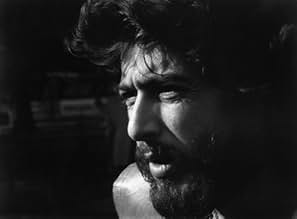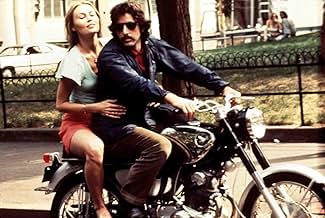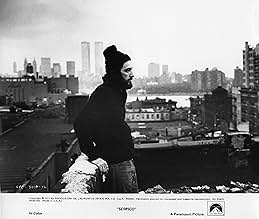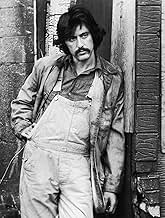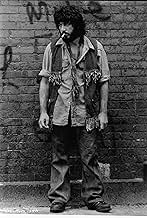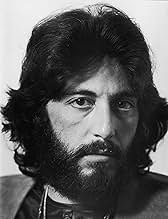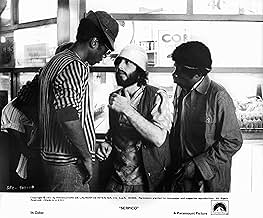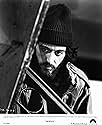Um policial honesto de Nova York chamado Frank Serpico denuncia a corrupção desenfreada na força apenas para que seus camaradas se voltem contra ele.Um policial honesto de Nova York chamado Frank Serpico denuncia a corrupção desenfreada na força apenas para que seus camaradas se voltem contra ele.Um policial honesto de Nova York chamado Frank Serpico denuncia a corrupção desenfreada na força apenas para que seus camaradas se voltem contra ele.
- Direção
- Roteiristas
- Artistas
- Indicado a 2 Oscars
- 8 vitórias e 13 indicações no total
Barbara Eda-Young
- Laurie
- (as Barbara eda-Young)
Edward Grover
- Lombardo
- (as Ed Grover)
Albert Henderson
- Peluce
- (as Al Henderson)
Joseph Bova
- Potts
- (as Joe Bova)
Woodie King Jr.
- Larry
- (as Woodie King)
- Direção
- Roteiristas
- Elenco e equipe completos
- Produção, bilheteria e muito mais no IMDbPro
Avaliações em destaque
There have so many crooked-cops-themed films in the past 30 years that this film has lost a lot of its shock-and-awe. The long hair, wild clothes, beads, etc. really date this film, too, it being so early '70s in looks. It's almost become a "period piece" as if it were the Roaring Twenties except its the Sleazy Seventies.
All you have to do is look at the party scene in here and you'll get a glimpse at the early '70s, and most of it is not good. What IS good is Al Pacino's acting, of course. There have been very few films in which he starred that didn't displaying his acting talents to the fullest. This one, along with Dog Day Afternoon and few others, put him "on the map," making him a big star. He's been a "star" ever since.
This is a fairly long film but, like Pacino, it's rarely boring. The name of Pacino's character, "Serpico," has become synonymous with "honest cop." It demonstrates what a strong impact this movie had on millions of people.
Gritty? Yes. Profane? Yes; Memorable? Most definitely. When you speak of modern-day "classics," this film is one of them.
All you have to do is look at the party scene in here and you'll get a glimpse at the early '70s, and most of it is not good. What IS good is Al Pacino's acting, of course. There have been very few films in which he starred that didn't displaying his acting talents to the fullest. This one, along with Dog Day Afternoon and few others, put him "on the map," making him a big star. He's been a "star" ever since.
This is a fairly long film but, like Pacino, it's rarely boring. The name of Pacino's character, "Serpico," has become synonymous with "honest cop." It demonstrates what a strong impact this movie had on millions of people.
Gritty? Yes. Profane? Yes; Memorable? Most definitely. When you speak of modern-day "classics," this film is one of them.
9dtb
I'd been wanting to see SERPICO for some time; this real-life crime drama based on Peter Maas' nonfiction bestseller about an honest cop fighting corruption in the NYPD was one of the few grim-and-gritty New York crime dramas that my older brother didn't take me to see when I was a kid! :-) (I should explain that my brother, 9 years my senior, used to take me to the kind of movies he wanted to see -- films like TAXI DRIVER, REPORT TO THE COMMISSIONER, etc. Fortunately, I developed a taste for them as well, though our mother didn't think they were really appropriate for a girl as young as I was then. :-) No wonder this film helped young Al Pacino's then-rising star (he was fresh off THE GODFATHER when he began filming SERPICO) to soar to the stratosphere, complete with an Oscar nomination. Pacino's earnest intensity fuses Frank Serpico's disparate qualities into a spellbinding performance. The guy is a bundle of contradictions, the kind of man who could charm you, move you, and drive you crazy at the same time: a nice Catholic boy who can't commit to any of the devoted women in his life; an honest, downright rigid moralist who's also a free spirit known as "Paco" to his friends and lovers; and an undercover cop with detective aspirations whose hippie-like appearance rankled his superiors and fellow officers even as it helped him blend in on assignments. Pacino's riveting performance carries the film, with fine support by John Randolph, Tony Roberts, M. Emmet Walsh, Barbara eda-Young and Cornelia Sharpe, not to mention memorable uncredited turns by F. Murray Abraham, Judd Hirsch, Kenneth McMillan, and Tony LoBianco, among others. Sidney Lumet's taut direction of the script by Waldo Salt and Norman Wexler does Maas' source material proud, as well as taking advantage of evocative NYC locations (just try getting this kind of atmosphere in Canada, I dare you! :-). The sparing use of simple yet haunting music by Mikis Theodorakis sets the tone well. The end result: one of the best films of the 1970s and beyond. Rent the DVD to see some fascinating extras about the making of the film and the filmmakers' experiences with Frank Serpico himself, including interviews with Lumet and producer Martin Bregman (no Pacino, alas).
Frank Serpico begins his career with the NYPD as an idealistic rookie who believes in the moral value of policing. He has a simple and old-fashioned ethical code, an outlook which used to be known as honesty. What he finds is a moral sewer, five boroughs wide, in which almost every cop is on the take. The police are just another gang of hoodlums, but with more guns than the bad guys. Even basically decent cops go along with the kickback culture, because a locker-room psychology prevails in which values have become perverted. Squad loyalty is now a criminal conspiracy of silence. Detectives do not hesitate to shake-down hoods who are slow to pay. To Frank Serpico, this is simply wrong. He wants no part of it. And so his long agony begins.
Both responding to and helping to shape the mood of its time, a weary cynicism towards authority, "Serpico" arrived on the screen just as Watergate built to its climax. Americans could no longer regard their institutions as gleaming examples to mankind of optimism and good government. The film begins gloomily with Serpico badly wounded, having been shot in the face. We hear police and ambulance sirens fading, symbolically representing the life-force ebbing from Frank, and the withering of American dreams.
This first-class film is a triumph, and one that could easily have misfired. Had the crooked cops been depicted as mere thugs, then Serpico himself would have been an archetype, just another two-dimensional crusader. What gives the film its psychological richness is the realisation that the dishonest cops are NICE. These are affable, reasonable men who want to like Serpico and want to welcome him onto the team. The camaraderie is seductive and it's difficult for Frank to hold out against it. He is besieged by self-doubt, wondering if he is just a one-man awkward squad, or worse - a prima donna, sacrificing personal relationships on the altar of his own ego.
Again, the easy (but disastrous) course would have been to give Frank some big heroic speeches, allowing him to inveigh against corruption. The film chooses instead to go for psychological truth, and this is what makes the project outstanding. Appalled, afraid and despairing of ever changing anything, Frank withdraws into himself. He becomes the spectre at the feast, the silent rebuke, the muted but ever-present conscience of his colleagues.
Though Frank rejects the golden shield which is eventually offered, we feel that the system still means something. There are still some honest cops, and even after all these vicissitudes, the United States is still a nation of laws. Lumet's profoundly liberal and optimistic view of America ultimately shines through, but the final mood is one of quiet resignation rather than triumphalism. Right can prevail over wrong, but a price has to be paid. Serpico wins his titanic struggle, but he is diminished and saddened as a man.
The film contains some marvellous technical things. In the opening minutes, the action cuts between Frank as he is now (wounded, broken and alone) and as he started out (the clean-cut, idealistic rookie). These transitions are seamless, and the narrative logic is smooth and natural. We see Frank's first moment of disenchantment in a cafeteria when it dawns on him that cops get free handouts of food, but they have to take whatever comes. This first bewilderment develops until we see the gulf open up between Frank and the dishonest cops, the ones who take the money but also take the self-loathing.
The terrible stress to which Frank is subjected is depicted with skill. The police department has a huge institutional inclination to protect its own, and this vast weight is brought to bear on Serpico. Equally, the pressure is relieved cleverly at appropriate points in the narrative. Frank's 'collar' of Rudi Casaro reaches an explosive climax as this all too human guy reaches breaking-point. On the other hand, the romantic story-telling interlude with Laurie and Serpico's undercover cameo as an orthodox rabbi break the tension and vary the pace beautifully.
The second-unit work is of a uniformly high standard. We are shown atmospheric New York streetscapes with grubby brownstones and the massive, overbearing masonry of the Brooklyn Bridge, in knowing homage to the films noirs of twenty years earlier. The symbols are powerful. This city, and this police department, are too colossal for one man to stand against them. Practice sessions in the police firing gallery intelligently reinforce the film's undercurrent of foreboding. Paper targets obscure the gunmen's faces, suggesting a monolithic force united against Frank, then come hurtling towards him on pulleys, signifying the fate which is rushing to meet him.
Mikis (Zorba the Greek) Theodorakis has provided a classy score. I particularly liked the jazzy, minor-key horn passage.
Pacino puts in another of the towering performances which have distinguished him as the profoundest acting talent of his era. He is simply wonderful. Barbara Eda-Young gives top-notch support as Laurie, the genuinely loving partner who is destroyed by her man's seeming eagerness for martyrdom in rejection of domestic happiness. If ever an actor exuded confidence it's Tony Roberts, and he is ideally cast as Bob Blair, Serpico's well-connected ally. Though he can open City Hall doors, he can't actually help Frank at all. Nobody can. Christ-like, Frank understands that it is ordained - he must go to the hill alone.
Both responding to and helping to shape the mood of its time, a weary cynicism towards authority, "Serpico" arrived on the screen just as Watergate built to its climax. Americans could no longer regard their institutions as gleaming examples to mankind of optimism and good government. The film begins gloomily with Serpico badly wounded, having been shot in the face. We hear police and ambulance sirens fading, symbolically representing the life-force ebbing from Frank, and the withering of American dreams.
This first-class film is a triumph, and one that could easily have misfired. Had the crooked cops been depicted as mere thugs, then Serpico himself would have been an archetype, just another two-dimensional crusader. What gives the film its psychological richness is the realisation that the dishonest cops are NICE. These are affable, reasonable men who want to like Serpico and want to welcome him onto the team. The camaraderie is seductive and it's difficult for Frank to hold out against it. He is besieged by self-doubt, wondering if he is just a one-man awkward squad, or worse - a prima donna, sacrificing personal relationships on the altar of his own ego.
Again, the easy (but disastrous) course would have been to give Frank some big heroic speeches, allowing him to inveigh against corruption. The film chooses instead to go for psychological truth, and this is what makes the project outstanding. Appalled, afraid and despairing of ever changing anything, Frank withdraws into himself. He becomes the spectre at the feast, the silent rebuke, the muted but ever-present conscience of his colleagues.
Though Frank rejects the golden shield which is eventually offered, we feel that the system still means something. There are still some honest cops, and even after all these vicissitudes, the United States is still a nation of laws. Lumet's profoundly liberal and optimistic view of America ultimately shines through, but the final mood is one of quiet resignation rather than triumphalism. Right can prevail over wrong, but a price has to be paid. Serpico wins his titanic struggle, but he is diminished and saddened as a man.
The film contains some marvellous technical things. In the opening minutes, the action cuts between Frank as he is now (wounded, broken and alone) and as he started out (the clean-cut, idealistic rookie). These transitions are seamless, and the narrative logic is smooth and natural. We see Frank's first moment of disenchantment in a cafeteria when it dawns on him that cops get free handouts of food, but they have to take whatever comes. This first bewilderment develops until we see the gulf open up between Frank and the dishonest cops, the ones who take the money but also take the self-loathing.
The terrible stress to which Frank is subjected is depicted with skill. The police department has a huge institutional inclination to protect its own, and this vast weight is brought to bear on Serpico. Equally, the pressure is relieved cleverly at appropriate points in the narrative. Frank's 'collar' of Rudi Casaro reaches an explosive climax as this all too human guy reaches breaking-point. On the other hand, the romantic story-telling interlude with Laurie and Serpico's undercover cameo as an orthodox rabbi break the tension and vary the pace beautifully.
The second-unit work is of a uniformly high standard. We are shown atmospheric New York streetscapes with grubby brownstones and the massive, overbearing masonry of the Brooklyn Bridge, in knowing homage to the films noirs of twenty years earlier. The symbols are powerful. This city, and this police department, are too colossal for one man to stand against them. Practice sessions in the police firing gallery intelligently reinforce the film's undercurrent of foreboding. Paper targets obscure the gunmen's faces, suggesting a monolithic force united against Frank, then come hurtling towards him on pulleys, signifying the fate which is rushing to meet him.
Mikis (Zorba the Greek) Theodorakis has provided a classy score. I particularly liked the jazzy, minor-key horn passage.
Pacino puts in another of the towering performances which have distinguished him as the profoundest acting talent of his era. He is simply wonderful. Barbara Eda-Young gives top-notch support as Laurie, the genuinely loving partner who is destroyed by her man's seeming eagerness for martyrdom in rejection of domestic happiness. If ever an actor exuded confidence it's Tony Roberts, and he is ideally cast as Bob Blair, Serpico's well-connected ally. Though he can open City Hall doors, he can't actually help Frank at all. Nobody can. Christ-like, Frank understands that it is ordained - he must go to the hill alone.
A perfect, true to life film based on the true exploits of a young police officer named Frank Serpico. Serpico was an officer in a time when political corruption was rampant and many of his brethren were found "on the take." The true story is brought to the screen under the superb leadership and direction of Sidney Lumet and the brilliant performance of Al Pacino as Serpico. Serpico was said to be known for his eccentricity and Pacino plays it up every step of the way, from the hairy beard to the earrings; he immerses himself into the character. This is the first of two great pairings with Lumet and Pacino. They know character. You see it here and you see it in 'Dog Day Afternoon." They know the streets. Lumet is a avid filmmaker of "New York-style films." Pacino walks the beat in his hobo outfits and long hair as if he's a hippie, not a cop. Although an eccentric, Serpico cannot be bought and certainly cannot be had, by anyone... cop or crook Pacino was Oscar nominated, but lost to Jack Lemmon for his performance in "Save the Tiger." The film was also nominated for it's taut screenplay, based on the Peter Maas book of the same title.
Unquestionably one of the major films of the 70's dealing with a big theme (police corruption) and with some major talents at close to the top of their game throughout. Sydney Lumet spares us little in this gritty urban drama using almost fly-on-the-wall documentary technique to involve the viewer in the action and stand us directly alongside Pacino as crusading street-wise cop Frank Serpico. Serpico's naive idealism is at first bruised by what at first seems casual freeloading by almost everyone of his new colleagues on the force but which turns to literally a battering as he comes to appreciate just how endemic the inside corruption actually is. Lumet plants us firmly on location in contemporary downtown NY with its rundown apartment blocks, graffiti-strewn streets and lowlife criminal element (and that's just the police!) As for Serpico, we feel his frustration as he cracks under the pressure, his relationship with his girlfriend poisoned as he fails to make the powers-that-be sit up and address what to all intents and purposes is standard behaviour. It takes a great acting performance to carry the viewer all the way through this lonely journey, even when the character himself becomes at times obnoxious and unfeeling to his (few) supporters; thankfully Pacino gives a performance the real-life Serpico deserved. Only very occasionally lapsing into the "hoo-ha" overacting style that reached its nadir in "Scent Of A Woman", Pacino plays it cool and tight throughout, always wary, always looking over his shoulder, playing it for real. If one is slightly sceptical if not critical of his sometimes ridiculous-looking "Harry Hippy" persona, I think it can be forgiven as being of its time. The ensemble support acting is top-drawer too, everyone is believable as indeed they need to be to make this film work but particular praise should go to Barbara Eda-Young as his put-upon girlfriend and Tony Roberts, free of Woody Allen for once, as his main ally. It's not hard to see the prototypes here for the new generation cutting-egde TV shows which were soon to follow such as Kojak and particularly Hill Street Blues, but that's the least of this film's achievements. In summary then, this excellent film is proof that it's possible for Hollywood to address a potentially unpopular, certainly uncomfortable serious subject, make its point and still entertain.
Você sabia?
- CuriosidadesThe film was shot in reverse order. Al Pacino began with long hair and a beard, then for each scene, his hair and beard were trimmed bit by bit until he became clean-cut.
- Erros de gravaçãoThe prison "chain gang" being led into the wagon at the beginning has male and female prisoners on the same "chain," and both sexes are transported in the same wagon. The NYPD absolutely forbade that then, and still does.
- Citações
Frank Serpico: The reality is that we do not wash our own laundry--it just gets dirtier.
- Versões alternativasThere is one Australian VHS version released through RCA Columbia Pictures Hoyts Home Video in the 1980s which had all profanity overdubbed with tamer language, as well as some scenes of sexuality/nudity. Subsequent releases on DVD are uncensored.
- ConexõesEdited into O Show Não Pode Parar (2002)
Principais escolhas
Faça login para avaliar e ver a lista de recomendações personalizadas
- How long is Serpico?Fornecido pela Alexa
Detalhes
- Data de lançamento
- Países de origem
- Central de atendimento oficial
- Idiomas
- Também conhecido como
- Serpiko
- Locações de filme
- Lewisohn Stadium, Amsterdam Avenue, Manhattan, Nova Iorque, Nova Iorque, EUA(Meeting Scene with Bob Blair)
- Empresas de produção
- Consulte mais créditos da empresa na IMDbPro
Bilheteria
- Orçamento
- US$ 3.000.000 (estimativa)
- Faturamento bruto nos EUA e Canadá
- US$ 29.800.000
- Faturamento bruto mundial
- US$ 29.857.918
Contribua para esta página
Sugerir uma alteração ou adicionar conteúdo ausente




